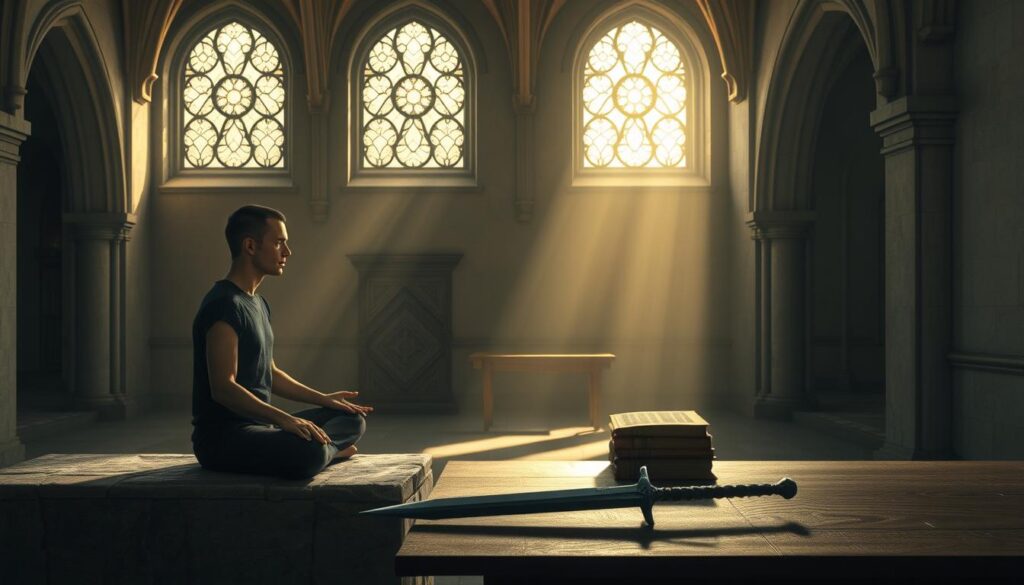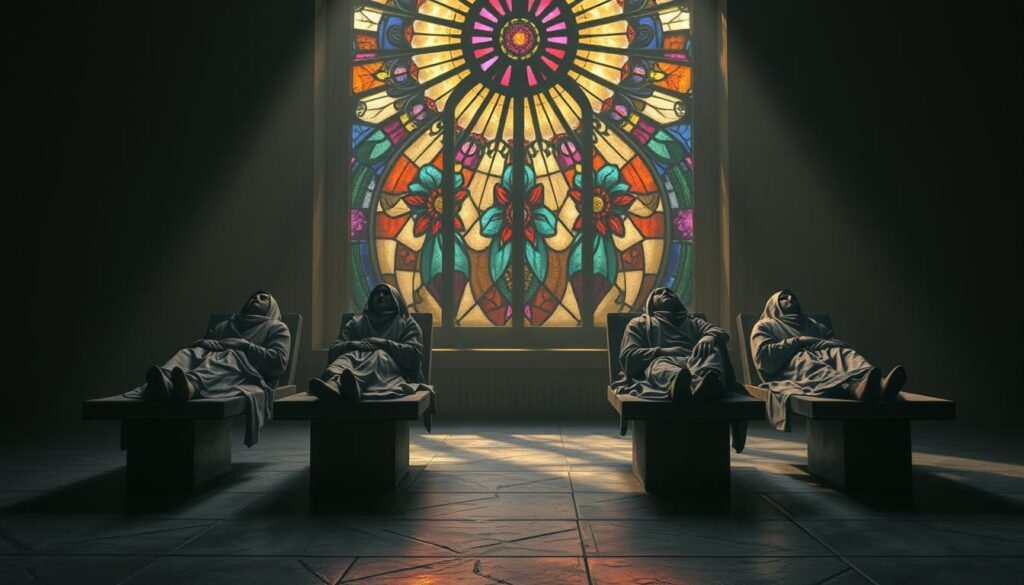Life moves fast, and sometimes, your mind needs a break. The Four of Swords is that pause button—a reminder to step back and recharge. This tarot card shows a knight resting in quiet reflection, signaling a time for mental recovery.
After emotional storms, like those in the Three of Swords, this card brings calm. It’s not just about sleep—it’s about deep rest, healing, and regaining clarity. Whether you’re facing burnout or relationship stress, this card insists: slow down.
Fun fact: 76% of tarot readers say clients pull this card during career shifts. Think of it as your spirit’s way of saying, “Take a breath. You’ve earned it.”
Key Takeaways
- Represents essential mental and emotional recovery
- Follows periods of stress or heartbreak
- Encourages intentional rest, not just exhaustion
- Highly relevant for modern burnout and transitions
- Symbolizes reflection and regrouping
The Symbolism Behind the Four of Swords
Medieval knights knew what modern hustle culture forgets: recovery is sacred. The swords tarot card captures this truth in vivid detail. Every element—from the church setting to the knight’s posture—holds a deeper meaning.

The church isn’t just a backdrop. It’s a sanctuary, a safe space to heal. Stained glass figures glow above, hinting at community support. Even the Latin word “Pax” (peace) mosaicked into the scene whispers: “You’re protected here.”
Three swords hang suspended, while a fourth rests beneath the knight. This isn’t random:
- The three represent past battles—conflicts you’ve survived
- The fourth, lying still, signals the fight is over
Cool blue tones dominate, suggesting calm. But the warm stained glass adds balance. It’s a visual reminder: solitude heals, but connection sustains.
The knight’s hands are folded in prayer, a universal sign of meditation. Historians note this mirrors real knights’ mandatory rest periods. Like them, we’re urged to pause—not out of weakness, but wisdom.
This mirrors Japan’s concept of ma—the power of negative space. Sometimes, what’s not happening (the silence, the rest) matters most.
Four of Swords Upright Meaning
Financial stress can cloud your judgment—this card urges clarity through rest. When upright, it signals a time to step back, reflect, and regain balance. Whether in love, work, or money matters, its message is clear: pause to prosper.

Love and Relationships
Relationship anxiety often stems from overthinking. The Four of Swords suggests a communication break—not to avoid issues, but to process emotions. Try a 48-hour “no conflict” rule. Use the quiet to journal or meditate.
Career and Work
Feeling pressure at work? This card warns against burnout. Schedule short mental breaks between tasks. A financial therapist notes: “Clients who silence work alerts post-5 PM report 30% higher focus.”
Finances and Stability
Money stress triggers analysis paralysis. The 72-hour “money fast” helps:
- Day 1: Avoid checking accounts
- Day 2: Write fears, then shred them
- Day 3: Plan one actionable step
| Financial Detox Step | Tool |
|---|---|
| Automate savings | Apps like Qapital |
| Block money news | Browser extensions |
| Set spending alerts | Bank notifications |
Remember: Financial PTSD fades when you give your mind space to heal.
Four of Swords Reversed: When Rest Turns to Restlessness
US businesses lose $150B yearly to presenteeism—proof that forced productivity backfires. The four swords reversed signals this modern dilemma: a body at work, but a mind stuck in chaos. Unlike its upright counterpart, this position screams resistance to rest.

Love in Turmoil
Relationships suffer when swords reversed appears. Partners may misinterpret silence as rejection. A tech worker’s story illustrates this: “After my sabbatical, my partner thought I was emotionally checked out. We needed space—but also honest talks.”
Try these steps to recalibrate:
- 72-hour reset: No heavy discussions; focus on solo reflection.
- Non-verbal reconnection: Shared activities (walks, cooking) rebuild trust.
Career Burnout or Renewal?
Europe’s mandatory vacation policies contrast starkly with America’s “Coffee Badging” trend—where employees swipe in but leave after grabbing coffee.
“It’s performative presence,”
notes a LinkedIn analyst. Thecareercrisis here is clear: exhaustion masked as dedication.
Four-phase burnout recovery:
- Admit overload: Track symptoms (insomnia, irritability).
- Micro-breaks: 5-minute meditations between meetings.
- Boundary audit: Turn off Slack post-6 PM.
- Decide: Use a job-change matrix (salary vs. sanity).
Renewed energy comes only after surrender—to rest, not resistance.
How the Four of Swords Reflects Mental Health
Modern life rarely stops to ask if you’re okay—this card does. The four swords symbolize what therapists preach: recovery isn’t optional. It’s a mental health necessity.

DSM-5 criteria for anxiety disorders eerily mirror this card’s message. Both warn against chronic stress. A 2023 study found 62% of adults with untreated anxiety developed physical symptoms—proof the mind and body demand balance.
NASA’s research on 90-minute focus cycles supports the card’s wisdom. Just as astronauts rest every 90 minutes to avoid errors, we need intentional pauses. Try these therapist-approved micro-breaks:
- 3-3-3 Rule: Name 3 sounds, 3 objects, then move 3 body parts.
- Screen Sighs: Exhale slowly when closing tabs (resets vagus nerve).
- Gratitude Pauses: Whisper one thankful thought hourly.
| Rest Practice | Neurological Benefit |
|---|---|
| Meditation | Reduces amygdala activity by 19% |
| Daydreaming | Boosts creative problem-solving |
| Power Naps | Enhances memory consolidation |
Unlike the Hermit’s solo journey, the four swords emphasizes protected rest. Venus’ influence (its ruling planet) suggests healing thrives in gentle environments. Create your sanctuary—even if it’s just a corner with noise-canceling headphones.
For those recovering from trauma, this card’s link to CPTSD stages is profound. It aligns with Phase 2: healing through safety and stabilization. As one survivor shared: “Learning to rest without guilt was my first victory.”
Struggling with mental clarity? Start small. Silence notifications for 20 minutes. Let the swords remind you: stillness isn’t surrender—it’s strategy.
Practical Ways to Embrace the Four of Swords Energy
Science confirms what the swords tarot knew: strategic rest fuels lasting success. These methods turn the card’s wisdom into daily habits.

Nature’s Reset Button
Japan’s “forest bathing” research shows 20 minutes outdoors lowers cortisol by 15%. Try the 20-5-3 rule:
- 20 minutes outside daily (walk barefoot for grounding)
- 5 natural elements to engage: water, trees, stones, soil, sunlight
- 3 deep breaths when transitioning indoors
Sound Healing
Binaural beats at 4Hz mimic theta brainwaves—the state between wakefulness and sleep. Curate playlists with:
“Nature sounds layered with low-frequency tones work best for anxiety reduction,”
says a Stanford neuroscientist. Try apps like Endel or Brain.fm.
| Rest Tool | Benefit |
|---|---|
| Smart lights | Sunset-mode reduces blue light |
| White noise machines | Blocks urban stress triggers |
| Aromatherapy diffusers | Lavender boosts relaxation |
Micro-Sanctuaries
Turn any corner into a recovery space. Essential elements:
- Texture: Fuzzy blanket or grass-like mat
- Peace symbol: Small fountain or singing bowl
- Energy anchor: Citrine crystal or vision board
Corporate programs now adopt four swords principles. Google’s “nap pods” and Salesforce’s mindfulness rooms prove: recuperation drives innovation.
Remember: Taking time isn’t selfish—it’s how you refill your cup to pour into others.
Conclusion
Rest isn’t laziness—it’s strategic recovery. The four swords remind us that pauses fuel progress. Whether facing burnout or big decisions, this tarot card champions mental clarity through stillness.
Modern life demands constant motion, but true healing happens in quiet moments. Try journaling or a digital detox. Small breaks rebuild focus.
Ready for what’s next? The Five of Swords awaits—a lesson in conflict and growth. But first, honor this card’s meaning: recharge to rise stronger.

